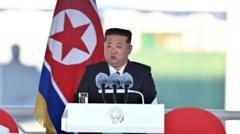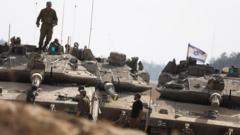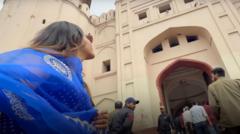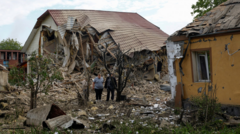In a series of violent confrontations this month, Indian security forces have escalated their efforts against communist militants, resulting in a significant death toll, including high-ranking rebel leaders.
Indian Security Forces Intensify Assault on Maoist Rebels, Casualties Rise

Indian Security Forces Intensify Assault on Maoist Rebels, Casualties Rise
As military operations ramp up, the government aims for a decisive end to a 50-year insurgency by March.
On May 21, 2025, security forces in central India reportedly killed at least 27 individuals during operations targeting Maoist insurgents in the Chhattisgarh region. According to local authorities, the action was intended to dismantle longstanding leftist groups that have been a source of conflict for over five decades. Prabhat Kumar, a local police chief, mentioned that several senior Maoist figures were either killed or seriously injured during the crackdown, with reports suggesting that Nambala Keshav Rao, a prominent leader known as Basavaraju, was among the deceased.
Prior to this operation, the Indian government claimed responsibility for the deaths of 31 members of the Maoist faction in a recent engagement in a hilly area straddling Chhattisgarh and its neighbor. India's Home Minister Amit Shah characterized this event as a "historic breakthrough" in their ongoing campaign, asserting that the objective is to eliminate the insurgency by March next year.
However, the rapid escalation of violence has raised concerns among human rights advocates. They urge investigations to ascertain whether all casualties were indeed militants or if innocent civilians were caught in the crossfire. Bela Bhatia, a human rights lawyer active in the affected regions, criticized the government's response time in returning the bodies to their families, often delaying identification processes, which is critical for grieving relatives.
As the situation develops, the tensions between state forces and rebel insurgents continue to grip the nation, raising critical questions about the methods employed to quell dissent and the human cost of such military operations.
Prior to this operation, the Indian government claimed responsibility for the deaths of 31 members of the Maoist faction in a recent engagement in a hilly area straddling Chhattisgarh and its neighbor. India's Home Minister Amit Shah characterized this event as a "historic breakthrough" in their ongoing campaign, asserting that the objective is to eliminate the insurgency by March next year.
However, the rapid escalation of violence has raised concerns among human rights advocates. They urge investigations to ascertain whether all casualties were indeed militants or if innocent civilians were caught in the crossfire. Bela Bhatia, a human rights lawyer active in the affected regions, criticized the government's response time in returning the bodies to their families, often delaying identification processes, which is critical for grieving relatives.
As the situation develops, the tensions between state forces and rebel insurgents continue to grip the nation, raising critical questions about the methods employed to quell dissent and the human cost of such military operations.




















